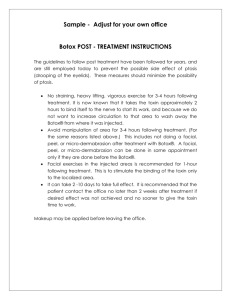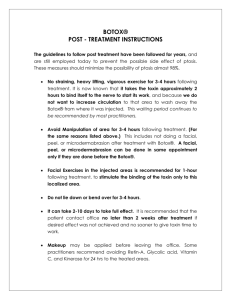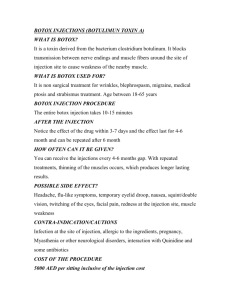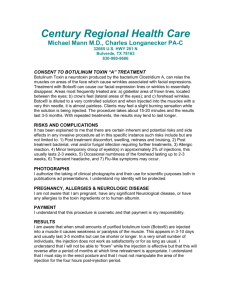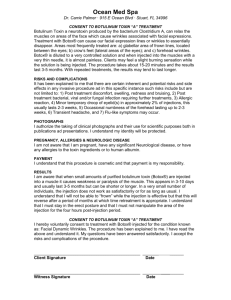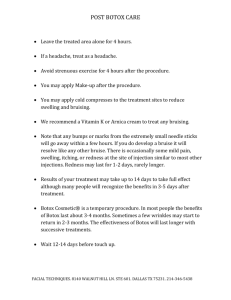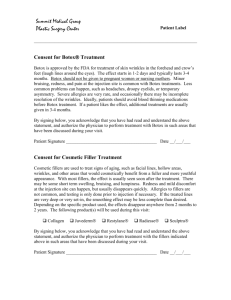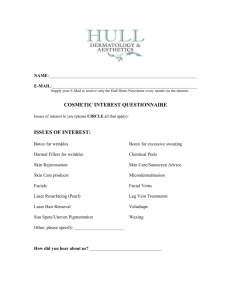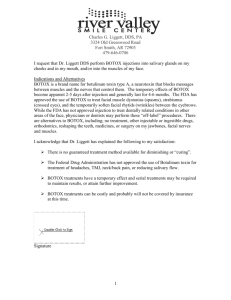1-Cosmetic Uses Of Botulinum Toxin (BOTOX).
advertisement
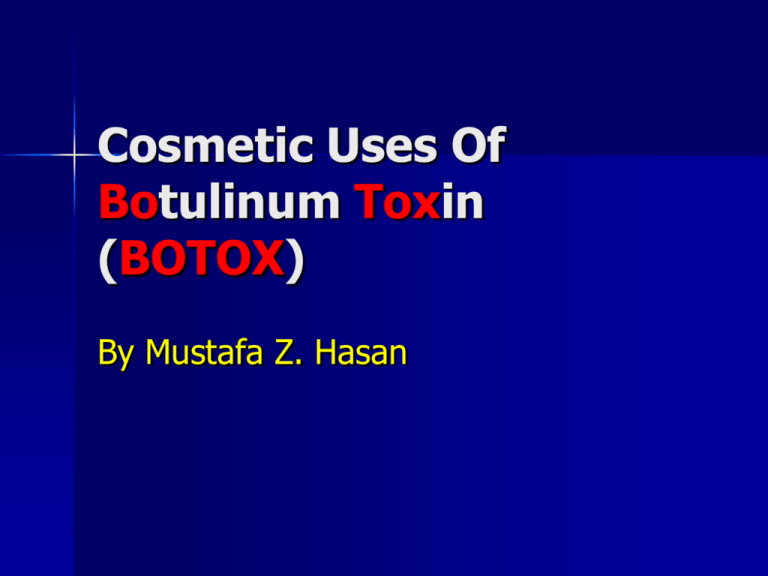
Cosmetic Uses Of Botulinum Toxin (BOTOX) By Mustafa Z. Hasan DEFINITION Botulinum toxin, is a protein and neurotoxin produced by bacterium Clostridium Botulinum. It’s the most acutely toxic substance known. It can cause botulism a serious life threatening illness in humans and animals, it is used for various cosmetic and medical procedures. MECHANISM OF ACTION The toxin is a fully sequenced, 1,295 amino acid chain. It consists of a heavy chain of 97 kilodaltons (kDa) connected by a disulfide bond to a light chain of 52 kDa. The heavy chain binds to the neuronal cell membrane, allowing passage of the light chain into the cytoplasm of the nerve. The light chain is a metalloprotease that cleaves the protein known as SNAP-25 (synaptosomalassociated protein 25). SNAP-25 is necessary for the transmitter vesicle containing acetylcholine with the cell membrane. Without fusion of the vesicle with the cell membrane, the neurotransmitter cannot be released into the synapse and a presynaptic neural blockade is created. Clinically, the beneficial effects of the toxin are apparent for 3 to 6 months. it typically takes 6 to 7 months for all of the clinical effects to fade. there are more than 200 different conditions reported in the scientific literature that can be treated with the toxin, including blepharospasm, strabismus, cervical dystonia, torticollis, achalasia, spasmodic dysphonia, anal fissure,…. APPLIED MECHANISM OF ACTION As long as a wrinkle is caused or partially caused by muscular action, it can be treated with botulinum toxin A. a glabellar rhytid is nearly completely caused by the actions of the corrugator and procerus muscles and can be completely eradicated in a young patient. Vertical lip rhytides in an elderly woman with thin skin, sun damage, a history of smoking, and loss of lip volume can only be partially improved by injection of the toxin PREPARATIONS The Clostridium botulinum bacteria secretes eight distinguishable exotoxins. The most potent of these serotypes is A (botox) Myobloc (toxin B) is not approved for cosmetic purposes, Although the onset of action is faster than that of Botox, the increased pain on injection (relatively low pH of 5.6) and decreased duration of action limit its cosmetic usefulness. Botox is supplied as a freeze-dried crystalline complex in a vial containing 100 units. According to the labeling of the product, it should be mixed with 2.5 mL of nonpreserved saline. Botox injection is contraindicated in: disorders of neuromuscular transmission, such as myasthenia gravis and Lambert-Eaton syndrome. in patients taking aminoglycoside antibiotics, potentiate the effects of the toxin. pregnant women, breast-feeding women..?? DOSAGE Just as dilution of Botox is a personal choice, so is dosage in most circumstances. Every patient is different and requires a different dose placed differently across the muscle being treated. For example, most practitioners inject about 25 units, on average, per glabella. Some dermatologists advocate as much as 80 units, but some patients have excellent results with as little as 7.5 units and some require as much as 27.5 units. Men typically require higher doses as the muscle mass tends to be greater. Posttreatment Instructions Don’t massage the treatment area. Contract and relax the treated muscles for 90 minutes to 2 hours. No need to limit physical activity, but avoid bending, flying, or exposure to heat for 2 hours after treatment. These practices may help reduce unwanted diffusion, but no controlled studies have been conducted . GLABELLA The glabella was the first area to be treated cosmetically with Botox. The median dose for treating the corrugator and procerus muscles is 17.5 units for women and 20 units for men. Horizontal frowners are not injected in the procerus muscle. Vertical frowners are injected in the medial portion of the corrugator and procerus muscles. FOREHEAD The dosage range for the frontalis is 3.75 to 35.0 units. Care must be taken to not overly denervate the frontalis because it can lead to an overly smooth, artificial appearance, brow ptosis, and eyelid ptosis in the patient who has been using his frontalis as an accessory eyelid elevator. The strongest portions of this muscle are targeted, not the rhytides. No standard pattern of injection is used. CROW’S FEET AND LOWER EYELID The lateral and inferior orbicularis oculi is weakened to diminish crow’s feet and lower eyelid rhytides in selected patients. overzealous injection can yield an unpleasant deer-inthe-headlights appearance and even cheek ptosis. Excessive chemodenervation of the orbicularis oculi across the lower lid can cause ectropion or lower-lid retraction. most patients receive between 3.75 and 5.0 units per side. Treating Bunny Lines Target muscles are nasalis and procerus. The usual number of injection, 1 per side for nasalis and 1 in midline for procerus. Usual dose is 2-5 u divided evenly for nasalis and 1 u for procerus. BROW ELEVATION Botox can easily and reliably lift the brows in excess of 6 mm. When portions of the frontalis are weakened, the other portions of the frontalis lift more strongly. The muscle segments that can depress the medial brow: the procerus, transverse heads of the corrugator, oblique heads of the corrugator, depressor supercilii, medial orbicularis oculi, and in some patients, the nasalis muscles. The lateral brow is depressed by the cephalic portion of the lateral orbicularis oculi. There is no standard pattern of injection for brow elevation. For a more medial brow elevation, the medial depressors are eliminated and the lateral frontalis is weakened, leaving the medial frontalis strong. For a more lateral elevation, the lateral depressor and the medial frontalis are injected. For a peaked and arched brow, the lateral depressor is weakened and the frontalis over the junction of the middle and lateral third of the brow is left strong. THE NECK Botox injections in platysmal bands can yield excellent results. The best patients have minimal skin excess and relatively strong bands. current dose range is 15 to 35 units for the neck. NASOLABIAL FOLD The levator labii superioris alaeque nasi muscle is the muscle mainly responsible for the medial nasolabial fold and the final 3 to 4 mm of central upper lip elevation. Weakening of this muscle results in smoothing of the medial nasolabial fold and a change in the smile pattern of the patient. Rubin described the three major smiling patterns in 1974. The most common, or “Mona Lisa,” smile pattern. The canine smile pattern. The gummy smile pattern Canine smile Gummy smile PERIORAL LINES 1) 2) 3) The most common rejuvenative procedure for this area is the injection of filler materials. Botox indicated in: patient that is already having Botox injected into other areas of the face not increasing the size of their lips at all, for fear of looking “done.” receives concomitant Botox and filler injection. current dosing range is only 2 to 7 units per lip. Overly weakening the upper lip leads to problems with plosive sounds, then general speech, and, finally, oral competence. Overinjection of the lower lip more readily leads to drooling and competence problems. MENTALIS Patients who have difficulty with oral competence tend to form an unattractive, dimpled pattern on the chin during active speech or when closing the lips. This appearance results from contraction of the underlying mentalis muscle. Dosing range for the mentalis is 2.5 to 12.5 units. Care is taken to inject the superficial mentalis only, leaving the deep mentalis fully functional. DEPRESSOR ANGULI ORIS depresses the oral commissures. This action contributes to the marionette lines and often creates a distinct horizontal rhytid below the commissure. TOO MUCH BOTOX… THANKS
